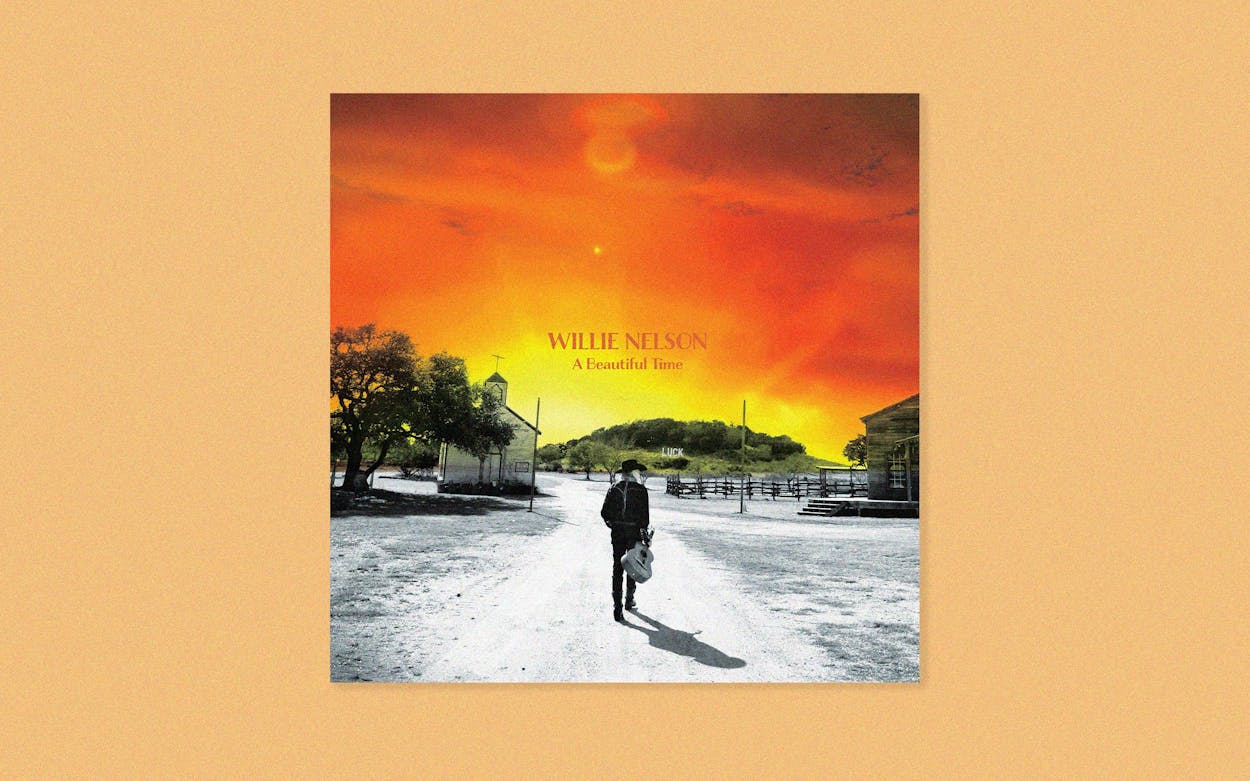A lot of real-world weight factored into A Beautiful Time. It’s Willie’s fourth album since the March 2020 COVID-19 lockdowns, and if the whole world essentially spent the subsequent months in an existential crisis, you have to figure the pressure was specific, acute, and near-constant for a man in his late eighties with weak lungs. And then there’s that very fact of Willie’s age. A Beautiful Time was released on his eighty-ninth birthday, and while he’s never been one to spend much energy looking back, the steady stream of old friends departing for the hereafter, along with an awareness of his own advancing years, has nonetheless colored recent efforts. The trend started with his 2016 tribute to the then recently deceased Ray Price, For the Good Times, and kicked fully into gear in 2017 with God’s Problem Child. It was the opening installment in what became known as Willie’s mortality trilogy, a series of records that found him lamenting the loss of those near and dear and winking at those who keep wondering when he’ll join them.
Given the timing, it’s no wonder that A Beautiful Time picked up where the trilogy left off, nor that it’s a quieter, more pensive record. Which is not to call it heavy. Willie still has fun keeping the inevitable at arm’s length, as on “I Don’t Go to Funerals,” one of five new cowrites with longtime producer Buddy Cannon, when he sings “My life has been a wonder / And I have found my place in time / But I don’t go to funerals / And I won’t be at mine.” But as a general matter, the tempos are a little slower, the reflections a little more direct. The title track, a woozy waltz written by Nashville hitmaker Shawn Camp, depicts Willie and the band touring Texas back in the old, trailer-behind-a-station-wagon days before Red Headed Stranger hit—exactly the kind of nostalgia you’d expect from an artist kept off the road for the first time in some seventy years. And while there may be a spare, brooding quality to “Dusty Bottles,” a track that Cannon calls his favorite on the record, the song is in fact a celebration of aging, with Willie singing, “There’s something to be said for getting wrinkles / Every song worth singing has those lines.”
And then, at other times, Willie seems almost to be explaining his younger self. For Willie nerds who were ever curious about “In God’s Eyes” off of 1971’s Yesterday’s Wine—specifically the lines “Never think evil thoughts about anyone / It’s as wrong to think as to say”—Willie finally puts flesh on those bones in a new song, “Energy Follows Thought,” singing, “Be careful what you ask for / Make sure it’s really what you want / Because your mind is made for thinking / And energy follows thought.”
Still, in a larger sense, the album is typical of so many Willie has made, a loose, well-played mix of his own compositions and some from topflight Nashville songwriters—Camp’s two credits are standouts, as is a cut written by Chris Stapleton and Rodney Crowell, “I’ll Love You Till the Day I Die”—along with a couple random covers thrown in from deep left field. The highlight of the latter is Leonard Cohen’s vaguely surreal “Tower of Song.” It’s a weird song that Willie’s son Micah brought to his dad’s attention, basically a look at songwriters’ purgatory, recorded by Cohen as a spooky lounge-lizard number. It’s also an odd choice for Willie, one of those titles that might give pause when you first see it in the credits. But the subtle island vibe in Cannon’s arrangement sucks you in straightaway. And while Willie’s version doesn’t quite redefine the song, it’s a perfect vehicle for his everyman humility, especially when he sings lines such as “I said to Hank Williams, ‘How lonely does it get?’ / Hank Williams hasn’t answered me yet / But I hear him coughing all night long / ’Bout a hundred floors above me in the Tower of Song.”
All told, A Beautiful Time is a rock-solid addition to the catalog, simultaneously a continuation of what he’s always done and a great snapshot of where he is now. “It’s not somber,” said Cannon, “just quiet, because that’s how Willie was when we recorded it. And that’s my job: to capture Willie.”
- More About:
- Music
- Willie Nelson








